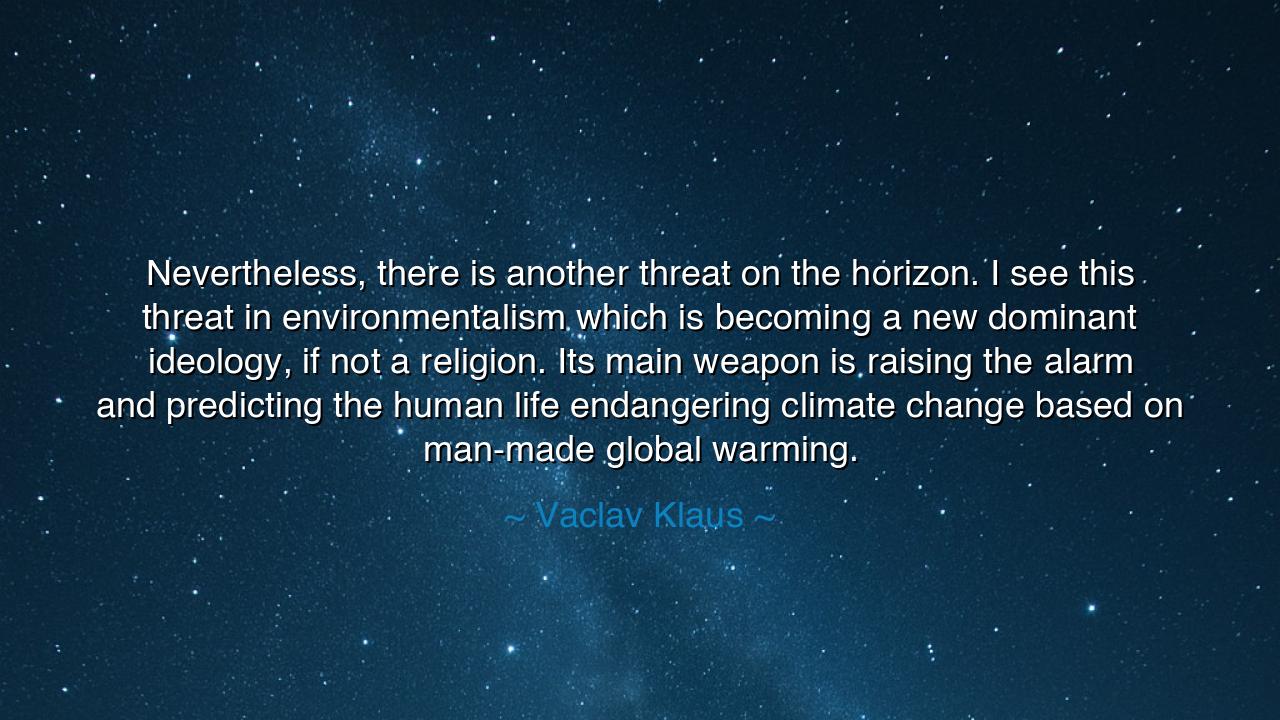
Nevertheless, there is another threat on the horizon. I see this
Nevertheless, there is another threat on the horizon. I see this threat in environmentalism which is becoming a new dominant ideology, if not a religion. Its main weapon is raising the alarm and predicting the human life endangering climate change based on man-made global warming.






In the cadence of a watchman at dusk, Václav Klaus warns: “Nevertheless, there is another threat on the horizon. I see this threat in environmentalism which is becoming a new dominant ideology, if not a religion. Its main weapon is raising the alarm and predicting the human-life-endangering climate change based on man-made global warming.” Hear what lives beneath the provocation. He is not speaking against rivers or forests; he is speaking against the hardening of any public cause into unquestioned dogma. He fears the moment when caution becomes creed, when policy is guarded by zeal rather than governed by evidence, when banners replace measurements and dissent is treated as sin.
The heart of the oracle is this: great truths, once enthroned, can drift into ideology. An ideology is a map that forgets it is a map. It seeks the neatness of final answers where reality gives only changing weather. When environmentalism becomes a “religion,” its rituals may outpace its reason; its raising the alarm may drown out calibration; its predicting may become a calendar of doom rather than a discipline of uncertainty. Klaus bids us remember that prudence is not panic, and that stewardship loses nothing by submitting to debate, revision, and proportionality.
To understand the origin of such a warning, consider the speaker’s country and century. Born in a land bruised by totalizing creeds, Klaus watched public life bent by slogans, statistics trained to obey power, and “settled” truths used to still the inconvenient voice. From that history emerges a reflex: beware whenever any single frame claims to explain everything. His words carry the aftertaste of systems where the party line stood taller than the weather vane, and where virtue was measured by conformity rather than accuracy.
Let a lamp be lifted from history to test his fear. Think of Lysenkoism in the Soviet Union—an agricultural doctrine enthroned as orthodoxy. Fields and famines were commanded to obey an idea; dissenters were punished, instruments silenced. Science did not fail because it asked questions about seeds and seasons; it failed because questions were no longer permitted. This is the pathology Klaus names: not the pursuit of knowledge, but the sealing of it. When any movement—green or otherwise—treats critique as treachery, it begins to prefer purity over truth.
Yet wisdom also requires the other lamp: cases where warning saved the house. The ozone wound narrowed because nations heeded evidence and acted together; rivers once aflame now run clearer where laws met measurements; lead left our fuel and children’s blood grew safer. These victories were not born of cynicism, nor of silence; they came from raising the alarm with data, from predicting without pretending omniscience, from policies tested, adjusted, and sometimes reversed. Thus, the antidote to zeal is not neglect; it is disciplined care.
What, then, is the lesson? Hold fast to the difference between reverence and religion, between cause and ideology. Let concern for climate change be brave, but let it also be bounded by transparency: models with error bars, claims with time stamps, tradeoffs spoken plainly. Build councils where engineers, ecologists, economists, and citizens test each other’s work with both rigor and respect. Favor policies that can learn: pilot before mandate, measure before multiply, sunset and review. Seek remedies that lower risk without raising sanctimony.
And here are practices, simple as bread, to keep a good cause from becoming a closed church: read primary studies before the poster; separate what we know from what we fear; welcome loyal opposition that sharpens proposals; pair urgency with humility; tie targets to mechanisms that can be audited. Invest in cleaner energy and sturdier grids, yes—but count the costs, watch the unintended, and change course when the instruments say “wrong way.” In this manner, love of the earth is not weakened by scrutiny; it is strengthened. For the world does not need new idols—it needs wise keepers. Let us be those keepers: devoted without dogma, alert without alarmism, and always ready to trade a slogan for a better truth.






AAdministratorAdministrator
Welcome, honored guests. Please leave a comment, we will respond soon